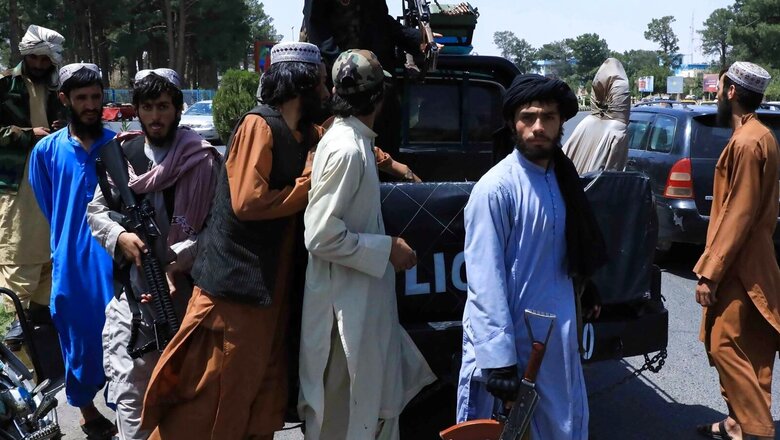
views
As the security situation in Afghanistan rapidly deteriorates following the US withdrawal of troops continuing apace, the role of other stakeholders—including Russia, China, and Iran—is witnessing an uptick. Over the years, Moscow has steadily enhanced its influence on the Afghan issue; whether it is the outreach to Taliban that began several years ago or engaging in the troika or extended troika format of talks, or even setting up the Moscow format of talks, the former superpower has extended its presence.
In fact, despite the deterioration of relations between Moscow and Washington, the two sides have been in regular consultations over the Afghan situation. Both the countries call for talks with all Afghans—the government, political leaders, Taliban, civil society—for a peace agreement.
Russian Interests in Afghanistan
Such an agreement is important for Russia that is interested in a stable Afghanistan to safeguard its security and strategic interests. It has alliance responsibilities under the Collective Security Treaty Organisation (CSTO), and a rising level of violence makes Russia concerned about its spill over into Central Asia and within its own borders. The issues related to the flow of refugees, drug trafficking, and spread of radicalism are other leading areas of concern for the former superpower. The threat of ISIS is also one of the top concerns. Already, the Russian Defence Minister Sergei Shoigu has warned about the movement of ISIS fighters from Syria, Libya, and other places to Afghanistan, leading to the strengthening of Russian capabilities at the military base in Tajikistan.
Moscow, which fears Taliban coming to power in Kabul, however, believes that engagement with the Taliban is needed to ensure that its interests are preserved on these issues. Despite the Taliban still being a banned organisation in Russia, the two sides have held several meetings. The Russian foreign ministry has noted assurances from the Taliban that it ‘would not violate the borders of the Central Asian counties.’ In addition, it will ‘ward off the threat of ISIS in Afghanistan and eradicate drug production in the country after the end of the civil war.’
ALSO READ | Afghanistan President Ashraf Ghani’s Pakistan Gambit Was Based on 3 Promises and None Were Kept
The assurances notwithstanding, Russia wants to be prepared for a future scenario if the Taliban fail to keep their promises on containing the spread of terrorism and radicalism. Already, both the Russian foreign and defence ministers have expressed concern about rising instability and worsening security situation, which will only worsen if Taliban sense that victory is close at hand.
Meanwhile, in light of the rapid Taliban advance over the past month, wherein it now exercises complete control over Afghanistan’s borders with Uzbekistan and Tajikistan, Russia recently concluded drills with Uzbekistan near the latter’s border with Afghanistan; and engaged in joint military exercises with Uzbekistan and Tajikistan. Joint Russia-China military exercises are also ongoing in northwest China, which is located east of Xinjiang, the region that shares a narrow border with Afghanistan.
Moscow has also expanded its contact with Pashtuns within the country, as opposed to its earlier contacts with primarily Uzbeks and Tajiks. This is being seen as part of its efforts to ensure preservation of influence ‘if one of these forces collapse’. In the region, these policies have also brought it into closer contact with Pakistan, which exercises enormous influence over the Taliban it created, besides engagement with other regional powers like China and Iran.
In fact, the withdrawal has ‘raised the stakes’ for both Russia and China, who now face a real ‘test’ in managing the situation. Amid the ongoing Russia–US tensions, the deteriorating situation in Afghanistan gives Russia the opportunity to question US role as a leading power, which it says has failed in the Afghan mission. But the US withdrawal also brings heightened uncertainty, even though Moscow has never wanted to see a permanent presence of Western troops in the country, lest it negatively impact its own influence.
Russia, India and Engagement with Regional Partners
India insists on officially engaging only with the elected government in Kabul, even as every other key stakeholder in Afghanistan continues to maintain direct contact with the Taliban. While its reasons for doing so have been understandable, given the experience of cross-border terrorism through Pakistani-backed terror groups in Taliban-dominated areas, the situation leaves it with little leverage in the emerging state of affairs. India would prefer a political settlement between the Afghan government and the Taliban, instead of the latter gaining power through military means. In order to expand its policy options and protect Indian interests, it has been argued that India has no better option but to engage with friendly regional partners, apart from engaging in back-channel talks with various Afghan groups as needed.
ALSO READ | Not Taliban, India’s Regional Security Challenges Come from Pakistan-China Nexus
Moscow could be helpful for New Delhi in reaching out to various Afghan players. Like Russia, India is concerned about the spread of extremism and radicalism beyond Afghan borders, and is not in favour of establishing an Islamic emirate. Indian Foreign Minister S. Jaishankar has noted the need for the two sides to work together to ensure that the ‘economic, social, and democratic’ progress made in the past years is preserved. The threat of ISIS is also a shared one. Both the parties would benefit from a stable Afghanistan established through political dialogue. Additionally, such a development will have a positive impact on connectivity plans of the two sides.
Apart from bilateral discussion on these issues, another avenue for India-Russia cooperation on Afghanistan would be through multilateral engagement in the Shanghai Cooperation Organisation (SCO). Given that the Central Asian states are deeply concerned about the security implications of an unstable Afghanistan, the format can be a useful one for cooperation in this domain.
The SCO–Afghanistan Contact Group provides a platform to coordinate with regional countries as well as the Afghan government directly on security issues which is an important part of Indian strategy. The threat of spread of radicalism and terrorism is a common concern, where issues of mutual concern can be pursued through Regional Anti-Terrorist Structure (RATS).
While it is evident that India’s outlook on Afghanistan will not always coincide with that of other players, it must endeavour to build a limited security agenda to safeguard its interests, a role where Moscow can step in.
Conclusion
Russia, which sees itself as a major Eurasian power, now has a chance to present itself as a responsible, stabilising power in the region. The absence of a political settlement till now, and prospects of a Taliban takeover of the country, raises the risk for Russia which wants to assure security in Afghanistan. To address this, dealing with security challenges through an active engagement with various regional stakeholders, including India, would be an important instrument. While its own approach on Afghanistan differs from that of New Delhi, which is particularly worried about Islamabad’s role, Russia’s long-term interests in Eurasia would benefit from ensuring that its outreach to Pakistan does not sour the relations with India.
On its part, New Delhi remains in a difficult position in Afghanistan today, and needs to establish contacts with multiple players and engage with regional stakeholders to protect its interests. This is not going to be an easy undertaking, especially since for other players like Russia, Iran, and Central Asia, India is ‘only one of the many friends in the region.’ Also, New Delhi lacks the leverage to be invited to various forums like the troika/extended troika, where the future of Afghanistan is being discussed.
This raises the importance of a direct conversation with Russia, and if the two sides can find common ground on Afghanistan, it would be a positive signal for the strategic partnership. While New Delhi would be able to preserve its interests in the war-torn country, Moscow would strengthen its position as a key Eurasian power as well as its relationship with India.
This article was first published on ORF.
The author is Junior Fellow with ORF’s Strategic Studies Programme. The views expressed in this article are those of the author and do not represent the stand of this publication.
Read all the Latest News, Breaking News and Assembly Elections Live Updates here.




















Comments
0 comment